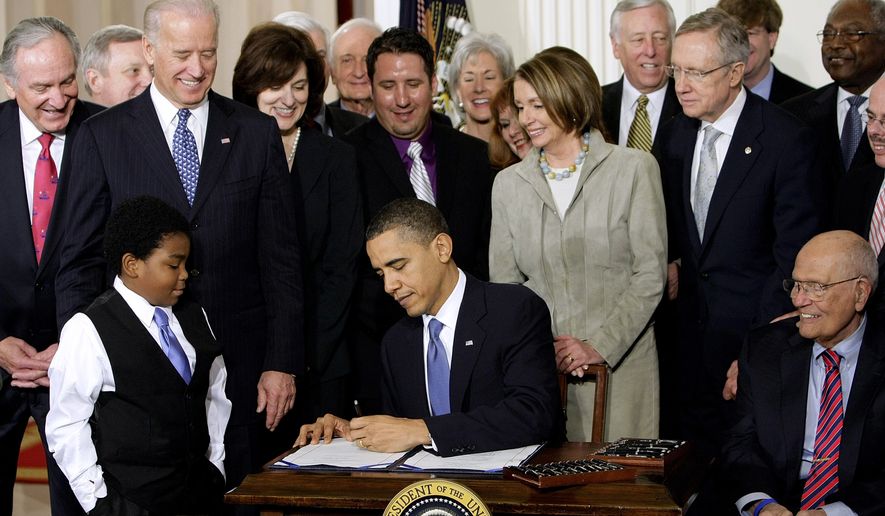The Supreme Court on Monday said it will hear challenges to President Obama’s signature health care law next spring, meaning it is likely to rule by June, right in the middle of the president’s bid for re-election.
The court has carved out more than five hours for oral argument at the end of March — far more than the usual one hour allotted to most cases, and evidence of the intense legal debate and high political stakes.
Justices had their pick of cases from among split rulings in three appeals courts, but they took the case from the 11th U.S. Circuit Court of Appeals, which struck down the individual mandate that requires all Americans to be covered by health insurance, but upheld other parts of the law including an expansion of states’ obligations under Medicaid.
“The 11th Circuit case raises all the important issues,” said Tim Jost, a law professor at Washington and Lee University.
The court will hear arguments on whether the individual mandate is constitutional and, if it isn’t, how much of the rest of the law must be struck ,down along with it. Justices added that they will hear whether challenges to the law are premature and must wait until someone is penalized for violating the individual mandate.
All sides welcomed the court’s announcement, counting on the justices to bring some certainty to what has been a bitter legal fight over the extent of federal power in the health care market.
“We know the Affordable Care Act is constitutional and are confident the Supreme Court will agree,” Dan Pfeiffer, Mr. Obama’s communications director, said in a statement.
The case the court is hearing was brought by 26 states and the National Federation of Businesses (NFIB), which argued that Congress exceeded its authority with the mandate and by requiring states to massively expand expensive Medicaid programs.
“Today’s news that the Supreme Court will hear arguments, possibly as soon as March, is reassuring news that we will soon reach finality on this critically important issue,” said Virginia Gov. Bob McDonnell, a Republican whose state has sued to block the law. “I am confident that the court will find that the act does overreach and is unconstitutional.”
A final ruling will come “not a day too soon” for small-business owners, said NFIB President Dan Danner. Likewise, Secretary of Health and Human Services Kathleen Sebelius said achieving a “fully functional system” by 2014 means questions about the law need to be “put to rest once and for all.”
“We hear from a lot of people saying that until the Supreme Court gives us a go or no-go we are going to wait,” she said. “That wait could harm the millions of Americans waiting for health care.”
A Supreme Court ruling next summer also means Mr. Obama will enter his final months of campaigning with perhaps his most defining legislation either vindicated or dismantled — or some combination of the two. As Americans remain divided over the health care law — with support for the overall law dropping as support for the individual mandate has appeared to rise — the political aftermath remains to be seen.
“If I were the president, I actually would be pleased,” said Stephen Presser, a law professor at Northwestern University. “If they rule it’s constitutional, then he can sail into the election, and if they rule it unconstitutional, he can fire up his base.”
The legislation passed in 2010 on the strength of Democrats in both chambers and has since become a galvanizing force for the GOP, which used its opposition to the law to score historic gains in last year’s elections.
The entire slate of Republican candidates vying to oppose Mr. Obama in next year’s election has vowed to try to repeal the health care law, and House Republicans have passed a series of bills designed to undo it. But each of those efforts has stalled in the Senate, where Democrats remain in control.
The legal challenge centers on whether Congress overstepped the bounds of the Constitution’s commerce clause, which grants the federal government the right to control interstate economic activity.
Obama administration attorneys say every American eventually will need health care, so requiring them to be covered is a justified regulation of the market.
Opponents, though, say it would be the first time in history that the government required Americans to take part in economic activity.
While the court was widely expected to take up the individual mandate, it was less certain whether it would consider challenges to the rest of the law since it has been upheld by appellate courts. While opponents of the law have said it can’t stand without the individual mandate, the White House argues that only a ban on insurance discrimination based on a person’s state of health is dependent on the mandate.
Mr. Jost said he was surprised by the court’s decision to consider whether the Medicaid expansion is constitutional.
“It’s troubling and, frankly, I think it’s a very bad idea for them to consider it because it just injects that much more uncertainty into the implementation for the state,” he said. “The states need to be moving ahead with implementing.”
• Paige Winfield Cunningham can be reached at pcunningham@washingtontimes.com.




Please read our comment policy before commenting.